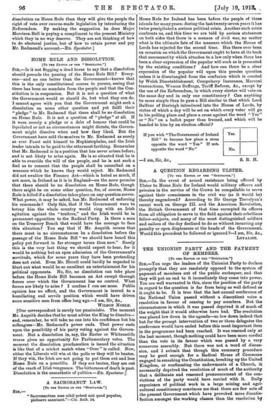A SACROSANCT LAW.
[To THE EDITOR or THE "SPECTATOR."]
SIR,— " Sacrosanettun esse nihil potest nisi quod populus, plebesve sanxisset."—Cic_ Balb. 14. Home Rnle for Ireland has been before the people of these islands for many years: during the last twenty-seven years it has twice precipitated a serious political crisis. Another such crisis confronts us, and this time we are told by serious statesmen on both sides that there is a menace of civil war, no matter what is the ultimate fate of the measure which the House of Lords has rejected for the second time. Has there ever been an occasion on which the Government ought to have at its back that sacrosanctity which attaches to a law only when there has been a clear expression of the popular will such as is presented by the existing conditions_? And how can there be a clear expression of the popular will upon this precise question unless it is disentangled from the confusion which is created by Welsh Disestablishment, Compulsory Insurance, Marconi transactions, Woman Suffrage, Tariff Reform, &c., except by the use of the Referendum, in which every elector will vote on the same day and in only one constituency ? Can anything be more simple than to pass a Bill similar to that which Lord Balfour of Burleigh introduced into the House of Lords, by virtue of which a day will be set on which every voter will go to his polling place and place a cross against the word " Yes" or " No" on a ballot paper thus framed, and which will be handed to him by an election official?
If you wish "The Government of Ireland Bill" to become law place a cross opposite the word "Yes." If nob opposite the word "No."










































 Previous page
Previous page